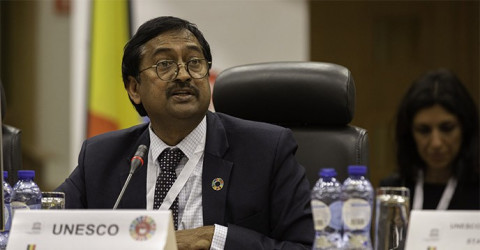
GCED Basic Search Form
Quick Search
You are here
News

Meet Jordan Naidoo, Director of Division for Education 2030 Support and Coordination at UNESCO, following his participation at the Comparative and International Education Society (CIES) 2019 he answered three questions on Sustainable Development Goal 4 (SDG4) and UNESCO’s role and expertise.
As Director of the Division for Education 2030 at the UN lead agency for education how do you view the last four years since the adoption of the 2030 Agenda for Sustainable Development?
This year on January 24, the UN celebrated the first International Day of Education. We are seeing SDG4 taking root in national policies and regional strategies, and in civil society movements. But despite advances, we are globally not on track to achieve SDG4 targets by 2030.
UNESCO convenes the multi-stakeholder SDG-Education 2030 Steering Committee which plays a key role in the global review of progress on education in the 2030 Agenda for Sustainable Development. Over the past three years, we have also convened regional SDG4 meetings in Amman, Bangkok, Buenos Aires, Cochabamba, Nairobi, Strasbourg involving governments, civil society, multi-lateral agencies, private sector, academia, youth to review progress and share experiences and solutions.
Regions have challenges that are distinctive to the region, but some of the challenges transcend regional boundaries just as some country challenges transcend country boundaries. With the support of partners, most of the regions have developed regional coordination mechanisms, implementation road maps, and regional monitoring frameworks demonstrating the value of partnership and a commitment to collective action.
At global level, the result of the Global Education Meeting (GEM) in December 2018 led to the outcome statement endorsed by Ministers and representatives of governments and others stakeholders. The Brussels Declaration provides key messages and priorities for collective focused attention and action.
What are some of the key levers and issues to promoting SDG4?
Even limited monitoring of Agenda 2030 overall and of SDG4, specifically, over the past 4 years, indicates lagging progress. Much greater effort is needed to ensure education truly empowers learners to address the social, cultural, environmental and economic challenges of our times, to take informed decisions and to become active responsible global citizens. Learning must reinforce an individual’s resilience and empathy, nurture an ability to appreciate diversity and change, and contribute to building sustainable societies.
Digitalization has affected almost every sphere of our lives, not our private lives but also world of work. Most commentators on the future predict that two thirds of all jobs that will be available for students in 15 years do not exist yet. Most new jobs are expected to be much more knowledge-based and highly demanding service oriented jobs. The skills mismatch is a global one, calling for more inclusive, future focused quality lifelong education and training systems, and flexible workplace pathways.
Noting this context and the discussions in various SDG consultations have recognised the need to develop a dedicated strategy on the future of education. UNESCO is launching its The Futures of Education project, which aims to generate global engagement and debate on learning and knowledge in relation to the multiple possible futures of humanity and of the planet.
What challenges would you highlight in our collective effort “to ensure inclusive and quality education and promote lifelong learning for all”?
From the global perspective, I see three major challenges: coordinating collective action among a multiplicity of actors; mobilizing adequate financing to meet the scale and scope of the SDG agenda; and addressing gaps related to three primary enabling conditions—human capacity, effective institutions and last but not least, political will.
The mobilization around SDG4 should be welcomed – this ambition of this goal requires transformations in how we work together and more resources. We are witnessing multiple efforts to mobilize resources, to raise awareness, to galvanize stronger political will, to establish new mechanisms to deliver better and differently.
In line with its mandated role on the coordination of SDG4, UNESCO has a responsibility to countries, to insist that we act together based on the comparative advantage of each institution, to communicate clearly and have the capacity to explain the benefit of new modalities. Even as we increase resources to meet the scale and scope of the agenda, we must be aware that fermentation of the global architecture carries a real risk of undermining all our efforts to realization of SDG4.
URL:
https://en.unesco.org/news/qa-director-leading-education-2030
